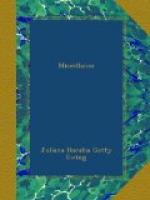Another correspondent of Notes and Queries speaks of ropes with dolls suspended from them as being stretched across every village street in Huntingdonshire on May-day, and adds, that not only ribbons and flowers were attached to these swinging May Ladies, but articles of every description, including “candlesticks, snuffers, spoons, and forks.”
There are no May carols rivalling those of Christmas, and the verses which children sing with their garlands are very bald as a rule.
A Maypole song of the Gloucestershire children would do very well to dance to—
“Round the Maypole, trit-trit-trot!
See what a Maypole we have got;
Fine and gay,
Trip away,
Happy is our New May-day.”
I have read of a pretty old Italian custom for the friends of prisoners to assemble outside the prison walls on May-day and join with them in songs. They are also said to have permission to have a May-day feast with them.
Under all its various shapes, and however adapted to the service of particular heathen deities, or to very rude social festivity, the root of the May-day festival lies in the expression of feelings both natural and right. Thankfulness for the return of Spring, anxiety for the coming harvests of the fruits of the earth, and that sense of exhilaration and hopefulness which the most exquisite of seasons naturally brings—brings more strongly perhaps in the youth of a nation, in those earlier stages of civilization when men are very dependent upon the weather, and upon the produce of their own particular neighbourhood—brings most strongly of all to one’s own youth, to the light heart, the industrious fancy, the uncorrupted taste of childhood.
May-day seems to me so essentially a children’s festival, that I think it is a great pity that English children should allow it to fall into disuse. One certainly does not love flowers less as one grows up, but they are more like persons, and their ways are more mysterious to one in childhood. The cares of grown-up life, too, are not of the kind from which we can easily get a whole holiday. We should do well to try oftener than we do. Wreaths do not become us, and we have allowed our joints to grow




